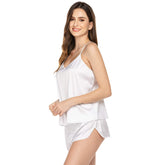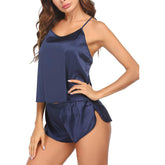Do Silk Sheets Make You Sweat?
Do Silk Sheets Make You Sweat?
Silk sheets don't make you sweat any more than usual. It’s a common misconception, but the truth is, real silk can actually have a cooling effect! Here’s what our team at Slipintosoft believes you should know about the temperature-regulating benefits of silk sheets and why they are a better choice than others.
Silk Sheets and Temperature Regulation
Silk bed sheets aren’t just a luxurious addition to your bedroom. They also play a significant role in temperature regulation.
Breathability
Silk fibers are naturally smooth and allow for better air circulation compared to other fabrics. This means that air can move freely through the sheets, which helps to stop heat from building up and provides a cooler sleep environment. The lightweight nature of silk enhances this airflow, helping you stay comfortable throughout the night.
Another big advantage of silk sheets is their ability to pull moisture away from the body. Silk can absorb up to 30% of its weight in moisture without feeling damp! This helps to keep you dry and comfortable, especially if you tend to sweat during the night. By drawing moisture away from the skin, silk sheets help to maintain a consistent body temperature, which reduces the likelihood of waking up feeling hot and sticky.
Thermal Insulation
Silk also has natural insulating properties that help to retain body heat on cooler nights. At the same time, silk is also efficient at dissipating excess heat, which means it prevents overheating by releasing trapped heat into the surrounding air.
This dual action of retaining and dissipating heat makes silk sheets a versatile bedding option that can adapt to different temperatures and seasons.
Silk Sheets vs. Other Fabric
Silk sheets are often praised for their luxurious feel and cooling properties. But are silk sheets hot compared to other popular fabrics? Here’s a quick comparison.
Silk vs. Cotton

Silk and cotton are both popular bedding choices, but they have distinct differences in terms of heat reduction:
- Breathability: Silk is a natural protein fiber that’s highly breathable. It allows air to circulate easily, wicks away moisture, and keeps you cool during hot nights. Cotton is also breathable to an extent, but it tends to retain more moisture, which can make you feel warmer.
- Thermal Regulation: Silk naturally regulates temperature, so it keeps you cooler in hot weather and warmer in the winter chill. Cotton sheets offer good insulation but don't have the same level of thermal regulation.
- Feel: Silk has a smooth, luxurious feel that glides easily over the skin, reducing friction and heat buildup. Cotton has a more textured feel, which can sometimes cause friction against the skin leading to heat.
Silk vs. Tencel

Tencel is a popular eco-friendly fabric made from eucalyptus wood pulp. Here’s how it compares to silk in terms of cooling:
- Moisture-Wicking: Both silk and Tencel are excellent at wicking away moisture. However, Tencel is slightly better at absorbing and releasing moisture quickly, so it’s a great choice for hot sleepers.
- Breathability: Tencel and silk both have high breathability levels, which creates a cool sleeping environment. Both fabrics are a good choice.
- Softness: Silk has a natural sheen and smoothness that Tencel mimics quite well. However, silk’s natural fibers tend to feel more luxurious and velvety soft to the touch.
Silk vs. Polyester

Polyester is a synthetic fabric often used in bedding. Here’s how it compares with silk regarding heat reduction:
- Breathability: Silk is far superior in breathability. Polyester tends to trap heat and moisture, making it less ideal for hot sleepers.
- Moisture Management: Polyester doesn’t wick moisture or absorb sweat as effectively as silk. This can lead to feeling clammy on hot nights, while silk keeps you dry and cool.
- Comfort: Compared to polyester, silk is much softer and more comfortable against the skin. Moreover, polyester can feel rough, scratchy, and less inviting.
Silk vs. Bamboo

Bamboo fabric has gained popularity in recent years for its eco-friendly qualities. Here’s how it compares to silk:
- Breathability: Both silk and bamboo are highly breathable fabrics that promote air circulation and keep you cool. Bamboo can have a higher breathability rating, but they are very similar.
- Moisture-Wicking: Bamboo sheets excel at wicking moisture away from the body, similar to silk. Both fabrics help keep you dry and comfortable.
- Softness: Bamboo fabric is very soft, but silk is often considered even smoother and more refined. Both provide a gentle, cooling touch against the skin.
What Affects Your Temperature During Sleep?
Other than the fabric of your sheets, multiple factors can impact your body temperature while you sleep. Here are some key aspects to consider if you want to get a cool night’s sleep:
Room Temperature
Ideally, your bedroom should be cool, as a lower ambient temperature helps your body maintain its natural temperature cycle. The National Sleep Foundation recommends keeping your bedroom between 60 and 67 degrees Fahrenheit (roughly 16–19 °C) for optimal sleep hygiene. Too warm or too cold can make it harder to fall and stay asleep.
Bedding Material
Natural fibers like silk, cotton, and linen are breathable and help wick away moisture, keeping you cool. In contrast, synthetic materials may trap heat, which typically leads to overheating during the night. Choose bedding that compliments the season, such as light sheets for summer and warmer blankets for winter, to maintain a comfortable sleep environment.
Humidity
Humidity is all about the level of moisture in the air. High humidity can make the air feel warmer and more oppressive, causing you to sweat and sleep restlessly. On the other hand, low humidity can dry out your skin and nasal passages. Aim for a humidity level between 30% and 50% to create a balanced environment that supports restful sleep.
Health Conditions
Certain health conditions can affect your body temperature during sleep. For example, fever, hot flashes during menopause, and hyperthyroidism can cause night sweats and temperature fluctuations. Also, medications for various illnesses may have side effects that influence your sleep temperature.
If a health condition is the cause of your night sweats, silk sheets can help to a small degree but they won’t fix the problem. It’s a good idea to have a checkup to make sure you’ve ruled out any health issues.
How to Choose the Right Silk Sheets for Staying Cool

Choosing the right silk sheets can make a big difference in your sleep quality, especially if you tend to get hot at night. However, not all silk sheets are created equal. Here are some key factors to consider when selecting silk sheets to help you stay cool and comfortable.
Thread Count
Thread count refers to the number of threads woven into one square inch of fabric. For silk sheets, a higher thread count often means a lavishly smoother and more durable fabric.
Silk sheets with a thread count between 400 and 600 are generally considered ideal for a balance of softness and breathability. A higher thread count might seem appealing, but it can also make the sheets denser and reduce breathability, which could trap heat.
Momme Weight
Momme weight measures the weight and density of silk fabric. For silk sheets, a momme weight of between 19 and 25 is usually recommended for silk bedding as well as silk pillowcases.
Sheets with a momme weight within this range offer a good balance between durability and lightweight comfort. A higher momme weight can provide more durability, but it can also be less breathable and less ideal for staying cool.
Weave Type
Silk sheets’ weave type affects their texture and breathability. The most common weave types for silk sheets are charmeuse and habotai. Charmeuse silk is known for its smooth and shiny finish on one side, with a dull back on the other. It’s remarkably breathable and feels cool against the skin, making it a popular choice for hot sleepers.
Habotai silk, on the other hand, is lighter and more matte. It’s also a good option if you’re looking for a cool and breathable fabric. When choosing the weave type, consider how the fabric feels against your skin and its breathability to ensure maximum comfort.
Are There Disadvantages to Using Silk Sheets?
Silk sheets are smooth and luxuriously soft, with a natural sheen that makes them exceptionally attractive. However, there are some downsides to using them that you might want to consider before making this investment.
Cost
One of the main disadvantages of silk sheets is the cost. Silk is a natural fiber that requires a lot of time and effort to produce. This makes silk sheets more expensive compared to sheets made from cotton or synthetic materials. If you’re on a budget, this might be a drawback.
Maintenance
Silk sheets need special care to maintain their quality and longevity. They are delicate and can easily be damaged if not handled properly. Washing silk sheets usually requires gentle hand-washing or using a delicate cycle on your washing machine with a special detergent. They should be air-dried and kept out of direct sunlight to prevent the fabric from weakening and losing its color.
Durability
Silk is a fragile material that can tear or snag more easily than other fabrics. This means silk sheets may not last as long, especially if they are used frequently or not maintained correctly. Sharp objects, including jewelry or even rough skin, can damage the fabric.
Slippery Texture
The smooth and slippery texture of silk sheets can be uncomfortable for some people. The sheets might not stay in place, which can force you to frequently adjust them during the night. This slipperiness can be especially bothersome if you move around a lot in your sleep.
Do Silk Sheets Make You Sweat? | FAQs
Do Different Types of Silk Affect Sweating?
Different types of silk can affect how much you sweat. The most common types of silk used in bedding are mulberry silk, wild silk, and synthetic silk.
- Mulberry Silk: This is the highest quality silk and is known for its smooth texture and breathability. It’s made from silkworms that feed on mulberry leaves. Pure mulberry silk sheets are highly breathable and wick away moisture, helping to keep you cool and dry throughout the night.
- Wild Silk: Wild silk is produced by silkworms in their natural habitat. It’s less uniform and smooth than mulberry silk, but still offers good breathability. Wild silk sheets can help manage sweating, but they might not be as effective as mulberry silk in keeping you dry.
- Synthetic Silk: Synthetic silk, made from materials like polyester, is less breathable than natural silk. It can trap heat and moisture, leading to increased sweating. If you’re looking to reduce sweating, natural silk sheets are a better option.
How Do I Care for Silk Sheets to Maintain Their Cooling Properties?
Proper care is essential to maintain the cooling properties of silk sheets. Here are some tips:
- Gentle Washing: Hand wash your silk sheets or use a gentle cycle on your washing machine with cold water. Use a mild detergent specifically designed for delicate fabrics to avoid damaging the silk fibers.
- Avoid Heat: Never use hot water to wash silk, and avoid high heat when drying. Air drying is the best method. If you must use a dryer, choose the lowest heat setting.
- Ironing: If you need to iron your silk items, use a low heat setting and place a cloth between the iron and the silk sheets to prevent scorching.
- Storage: Store silk sheets in a cool, dry place away from direct sunlight to prevent fading and deterioration. Store them in a breathable cotton bag to help protect them from dust and pests.
Can Silk Sheets Help With Other Sleep Problems Like Allergies?
Yes, silk sheets can help with sleep problems like allergies. Here’s how:
- Hypoallergenic: Silk is naturally hypoallergenic. It resists dust mites, mould, and mildew, which are common allergens that can disrupt sleep.
- Skin Sensitivity: Silk is gentle on the skin, making it a good choice for people with sensitive skin or conditions like eczema. The smooth texture reduces friction and irritation.
- Temperature Regulation: Besides helping with sweating, the temperature-regulating properties of silk can help maintain a comfortable sleep environment, reducing the likelihood of waking up due to being too hot or too cold.
What Are the Differences Between Silk and Satin?
Silk is a natural fiber derived from silkworms, whereas satin is a weave pattern that can be made from various fibers, including silk.
Key differences:
- Origin: Silk is a natural protein fiber, while satin is a weave structure.
- Composition: Silk is made from silkworms, while satin can be made from silk, polyester, nylon, or other fibers.
- Feel: Both silk and satin are soft and smooth, but silk generally has a more luxurious feel due to its natural properties.
- Breathability: Silk is more breathable than satin made from synthetic fibers. Essentially, this means that silk sheets will keep you cooler than satin sheets.
- Care: Both require delicate care, but silk typically needs more specialized cleaning methods.
- Cost: Silk is typically more expensive than satin made from synthetic fibers.










